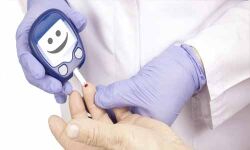- Home
- Medical news & Guidelines
- Anesthesiology
- Cardiology and CTVS
- Critical Care
- Dentistry
- Dermatology
- Diabetes and Endocrinology
- ENT
- Gastroenterology
- Medicine
- Nephrology
- Neurology
- Obstretics-Gynaecology
- Oncology
- Ophthalmology
- Orthopaedics
- Pediatrics-Neonatology
- Psychiatry
- Pulmonology
- Radiology
- Surgery
- Urology
- Laboratory Medicine
- Diet
- Nursing
- Paramedical
- Physiotherapy
- Health news
- Fact Check
- Bone Health Fact Check
- Brain Health Fact Check
- Cancer Related Fact Check
- Child Care Fact Check
- Dental and oral health fact check
- Diabetes and metabolic health fact check
- Diet and Nutrition Fact Check
- Eye and ENT Care Fact Check
- Fitness fact check
- Gut health fact check
- Heart health fact check
- Kidney health fact check
- Medical education fact check
- Men's health fact check
- Respiratory fact check
- Skin and hair care fact check
- Vaccine and Immunization fact check
- Women's health fact check
- AYUSH
- State News
- Andaman and Nicobar Islands
- Andhra Pradesh
- Arunachal Pradesh
- Assam
- Bihar
- Chandigarh
- Chattisgarh
- Dadra and Nagar Haveli
- Daman and Diu
- Delhi
- Goa
- Gujarat
- Haryana
- Himachal Pradesh
- Jammu & Kashmir
- Jharkhand
- Karnataka
- Kerala
- Ladakh
- Lakshadweep
- Madhya Pradesh
- Maharashtra
- Manipur
- Meghalaya
- Mizoram
- Nagaland
- Odisha
- Puducherry
- Punjab
- Rajasthan
- Sikkim
- Tamil Nadu
- Telangana
- Tripura
- Uttar Pradesh
- Uttrakhand
- West Bengal
- Medical Education
- Industry
Blood sugar control may prevent recurrence of stroke in diabetes patients: Study

The findings highlight the importance of keeping a close eye on blood sugar levels in diabetes patients who have had a stroke.
Korea: According to a recent study, there may be an ideal range of blood sugar to lower the risk of different types of vascular diseases like a stroke or heart attack later on, in people with diabetes who have a stroke. The study is published in Neurology, the medical journal of the American Academy of Neurology.
The study found that in patients with diabetes and ischemic stroke, the risk of vascular diseases were significantly associated with admission HbA1c. The optimal blood sugar range of admission was below 6.8%–7.0% and were different according to the subtype of ischemic stroke.
Blood sugar control has always been important for people with diabetes when it comes to preventing a stroke.
"We know that having diabetes may be associated with an increased risk of having a first stroke," said study author Moon-Ku Han, MD, PhD, of Seoul National University College of Medicine in Korea. "But our results indicate that there is an optimal blood sugar level that may start to minimize the risk of having another stroke, a heart attack or other vascular problems, and it's right in the 6.8% to 7.0% range."
The study involved 18,567 people with diabetes with an average age of 70. All participants were admitted to the hospital for an ischemic stroke, which is caused by a blood clot. Upon admission, researchers used a test called the hemoglobin A1C to determine people's average blood sugar level over the past two to three months. This test measures a percentage of hemoglobin proteins in the blood coated with sugar. A level below 5.7% is considered normal; 6.5% or higher generally indicates diabetes. The participants had an average A1C of 7.5%.
Researchers then followed up one year later to find out if there was an association between A1C levels with the risk of having another stroke, a heart attack, or dying from these or other vascular causes.
Of all participants, 1,437, or about 8%, had a heart attack or died from vascular disease within a year of starting the study, and 954, or 5%, had another stroke.
The study found that people admitted to the hospital with A1C levels above the 6.8% to 7.0% range had an increased risk of having a vascular event like a heart attack, as well as having another stroke.
After adjusting for factors like age and sex, researchers found that people's risk for a heart attack or similar vascular diseases was 27% greater when they were admitted to the hospital with A1C levels above 7.0%, compared to those admitted with A1C levels below 6.5%. People's risk for having another stroke was 28% greater when admitted to the hospital with A1C levels above 7.0%, compared to those below 6.5%.
"Our findings highlight the importance of keeping a close eye on your blood sugar if you're diabetic and have had a stroke," Han said.
A limitation of the study is that people's blood sugar levels were measured only at the start of the study; no follow-up levels were available.
Reference:
Association of Prestroke Glycemic Control With Vascular Events During 1-Year Follow-up
Jun Young Chang, Wook-Joo Kim, Jee Hyun Kwon, Ji Sung Lee, Beom Joon Kim, Joon-Tae Kim, Jun Lee, Jae Kwan Cha, Dae-Hyun Kim, Yong-Jin Cho, Keun-Sik Hong, Soo Joo Lee, Jong-Moo Park, Byung-Chul Lee, Mi Sun Oh, Sang-Hwa Lee, Chulho Kim, Dong-Eog Kim, Kyung Bok Lee, Tai Hwan Park, Jay Chol Choi, Dong-Ick Shin, Sung-Il Sohn, Jeong-Ho Hong, Hee-Joon Bae, Moon-Ku Han
Neurology Sep 2021, 10.1212/WNL.0000000000012729; DOI: 10.1212/WNL.0000000000012729
Dr Kamal Kant Kohli-MBBS, DTCD- a chest specialist with more than 30 years of practice and a flair for writing clinical articles, Dr Kamal Kant Kohli joined Medical Dialogues as a Chief Editor of Medical News. Besides writing articles, as an editor, he proofreads and verifies all the medical content published on Medical Dialogues including those coming from journals, studies,medical conferences,guidelines etc. Email: drkohli@medicaldialogues.in. Contact no. 011-43720751


